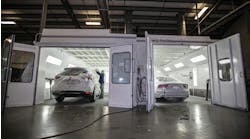A recent World Trade Organization (WTO) ruling dismissing a complaint filed against the U.S.-imposed tariff on car and light truck tires imported from China is being praised by the United Steel Workers union (USW) and assailed by the Tire Industry Association (TIA).
“It is no secret that since this misguided tariff took effect last year, most tire manufacturers have raised their prices, and we know of no U.S. tire manufacturing jobs that this tariff has been proven to have saved,” says TIA Executive Vice President Roy Littlefield.
“Backers of this tariff claim that it will protect American tire manufacturing jobs, whereas TIA believes there is no reliable data to support claims that the tariff has actually protected these jobs; it has only harmed American tire dealers, wholesalers and, ultimately, the consumer,” Littlefield contends.
“The USW has never shied from using every tool we have available to fight for fair trade and to fight for our members’ jobs,” counters Leo W. Gerard, the union’s president, maintaining that the decision “confirms that the rules of trade, when vigorously enforced, can be made to work for working people.”
Ambassador Ron Kirk, the U.S. trade representative in the matter, should launch a vigorous appeal, according to Littlefield. “We are hopeful that the WTO appellate hearing panel will see that this tariff is misguided and ineffective; that it has not saved American tire manufacturing jobs and has only hurt American consumers at a time when they can least afford it,” he says.
Littlefield calls on Kirk to “engage TIA members to learn firsthand the effect these tariffs have had on the American motorist. Our message to Mr. Kirk is simple: All you have now are competing opinions, and that’s no way to administer a critical trade issue. Set up a fair, independent and verifiable system to discover the true effectiveness of the tariffs.”
“Since the tariffs have been in effect, U.S. domestic tire production has increased, tire producers have made new capital investments and new jobs have been created for American tire workers,” says Gerard.
“We applaud the Obama Administration for standing up and defending American jobs in its original decision to impose relief and in its strong defense of that action at the WTO. We look forward to continue working with the administration to take full advantage of all enforcement tools available to us so that the benefits of fair trade are made available to all Americans,” he notes.
“Fair trade law enforcement should be the standard of our government in requiring China to fulfill its obligations under its accession agreement with the WTO more than a decade ago,” says Gerard.
The USW’s original petition was filed in April of 2009 under Section 421 of the U.S. Trade Act of 1974. China’s negotiated acceptance “was an important commitment made by the Chinese to permit its entry into the WTO,” according to Gerard. “It was designed to facilitate the mutually beneficial growth in trade by reducing the adverse effects of distortions inherent in China’s non-market economy.”
When the International Trade Commission (ITC) examined the surge in tire imports from China, “it discovered material injury to the domestic industry” through continuous declines in U.S. tire makers’ domestic capacity, production, shipments and employment from 2004 to 2008, he says.
Domestic tire capacity declined from 226.8 million tires to 186.4 million tires during the four-year investigation period, while actual production dropped from 218.4 million tires to 160.3 million tires, says Gerard.
As capacity utilization fell from 96.3 percent to 86 percent, the number of production workers substantially declined along with their hours worked and their wages, he continues.
The WTO panel found in favor of the U.S. regarding all of China’s objections to the tariff, according to Gerard, who remains confident that the USW will prevail.
Both sides have a right to appeal the findings to the WTO’s appellate body within 60 days.
For more information, visit www.tireindustry.org and www.usw.org.



